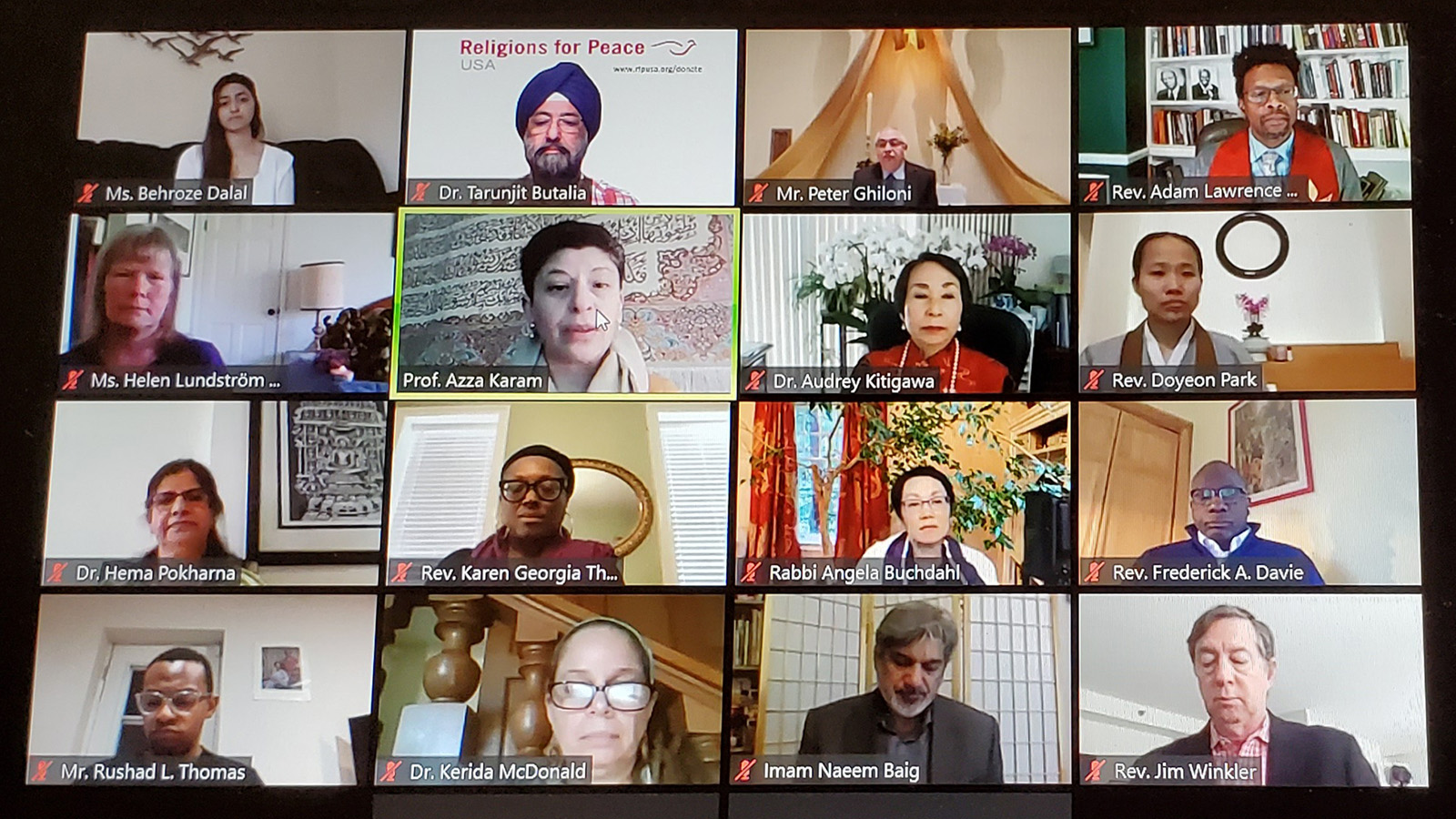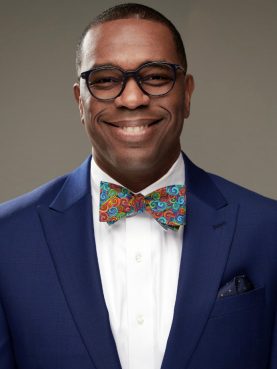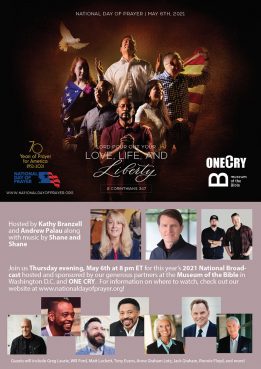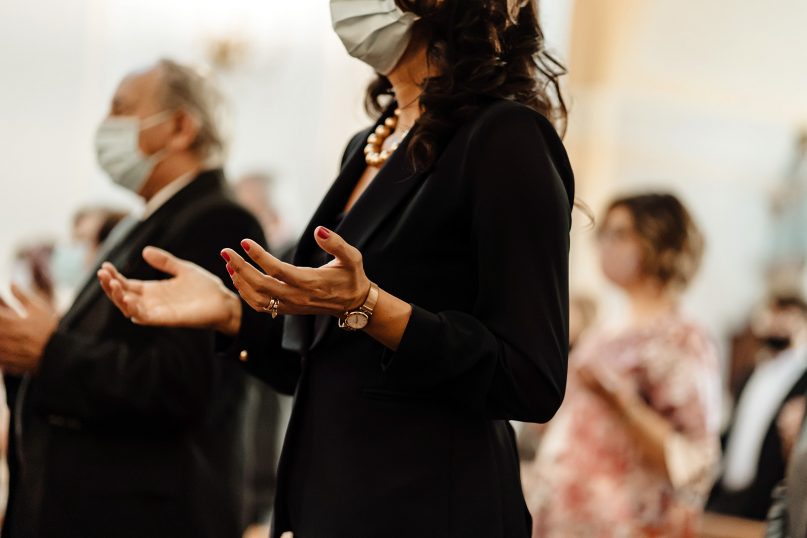(RNS) — In 2020, the COVID-19 pandemic prompted many observances of the annual National Day of Prayer to go virtual, with a focus on praying for those who were sickened or died.
A year later, as the 70th observance occurs on Thursday (May 6), pandemic prayers continue and, in some cases, are being coupled with petitions for racial justice.
In New York, Black clergy plan to join other faith and political leaders to call for houses of worship to be deemed essential as they continue to provide aid to communities of color disproportionally affected by the coronavirus.
In North Carolina, a council of churches is praying for courage after the deaths of Black people in police shootings.
RELATED: National Day of Prayer, reshaped by pandemic, includes interfaith and online events
And across the nation, a virtual broadcast of the National Day of Prayer Task Force will include an apology to Native Americans, who have lost land and lives as a result of U.S. policies.
The National Day of Prayer was proclaimed by Congress in 1952 and has been observed on the first Thursday in May since 1988.
“Prayer has nourished countless souls and powered moral movements — including essential fights against racial injustice, child labor, and infringement on the rights of disabled Americans,” President Joe Biden said in a proclamation.
“As we continue to confront the crises and challenges of our time — from a deadly pandemic, to the loss of lives and livelihoods in its wake, to a reckoning on racial justice, to the existential threat of climate change — Americans of faith can call upon the power of prayer to provide hope and uplift us for the work ahead.”
Biden is scheduled to make prerecorded comments during an evening broadcast of Pray.com that will also feature former Vice President Mike Pence.
The observance, which for many years has been predominated by evangelical Christians who planned public events across the country, continues in 2021 with people from a range of faiths participating.

People participate in a virtual National Day of Prayer event in 2020 organized by Religions for Peace USA. Video screengrab
Religions for Peace USA, which focused its first online National Day of Prayer event last year on the people infected with COVID-19, those who had died and their families, will concentrate this year’s virtual event on systemic discrimination affecting African Americans, Native Americans and Asian Americans, including Sikhs.
“It is time for us to stand up and own this racism, repent for our roles in this blot on our nation’s soul, and work towards long-term healing for all, especially our African American and Native American brothers and sisters who have suffered generational trauma due to the historical epidemic of racism,” said Tarunjit Singh Butalia, the interfaith group’s executive director. “We cannot be silent anymore.”
Pastor Gil Monrose, president of New York’s 67th Precinct Clergy Council, plans to join faith and political officials on the front steps of the Cathedral of St. John the Divine on the prayer day to encourage state officials to designate houses of worship as essential — not to allow them to offer in-person worship services but to highlight the way they have met local needs during the pandemic.

Pastor Gil Monrose. Courtesy photo
“Leaders from the president to Dr. (Anthony) Fauci to the governor, the mayor, were using Black clergy to help promote that the vaccine is safe. And yet still our houses of worship were never considered to be essential,” said Monrose, a Black man who pastors a Brooklyn church in addition to leading the council known as the “God Squad.”
Monrose added that being classified as essential could be helpful as faith groups seek funding from President Joe Biden’s American Rescue Plan for services such as COVID-19-related vaccination centers, testing sites and mental health assistance.
The North Carolina Council of Churches, which last year encouraged church bell ringing and other “joyful noises” amid social isolation, is focusing its online “Prayer Vigil for Courage” this year on the deaths of Black people. It said it will mark the “emotional swing” from the guilty verdicts in the trial of former Minneapolis policeman Derek Chauvin, under whose knee George Floyd died, to the police killing of Andrew Brown Jr., in the Southern state’s Elizabeth City.
“Sadly, these murders are representative of the violent racial injustices that plague our nation,” the council said. “Too often we must ask, ‘How long will it be until justice rolls down like a mighty stream?’”
During the National Day of Prayer Task Force’s virtual evening broadcast, former Sen. Sam Brownback is scheduled to read an apology to Native Americans. He originally proposed a resolution in 2004 about “ill-conceived policies by the United States Government regarding Indian Tribes.” The language was changed before it was included in a defense appropriations bill signed into law by President Barack Obama in 2009.

Promotional material for the National Day of Prayer Task Force. Courtesy image
“You can’t hear what is not spoken,” said Kathy Branzell, prayer task force president, in a statement. “The silence has been deafening in that an American President has never spoken an apology to the Native American people. While we know that this is not the only apology that needs to be spoken, this is certainly a root and a place to begin so that we can begin to see God heal our land.”
Branzell will co-host the gathering with Andrew Palau, the son of the late evangelist Luis Palau, in an event that will be broadcast from different locations and have a limited in-person audience at Washington’s Museum of the Bible.
Recent legislation has sought to mark the first Thursday in May as the National Day of Reason in addition to a national prayer day.
A proposed resolution by Rep. Jamie Raskin, D-Maryland, the co-chair of the Congressional Freethought Caucus, ties the suggested name for the day to the pandemic.
“Whereas irrationality, magical and conspiratorial thinking, and disbelief in science have undermined the national effort to combat the COVID–19 pandemic, contributing to the deaths of more than 555,000 people in the United States,” it reads in part, the House of Representatives “encourages all citizens, residents, and visitors to join in observing this day and focusing on the central importance of reason, critical thought, the scientific method, and free inquiry to resolving social problems and promoting the welfare of humankind.”
As of April 28, the resolution had been referred to a House committee but no further action had been taken.
This story has been updated.
RELATED: Trump, rabbi of attacked synagogue observe National Day of Prayer at White House





